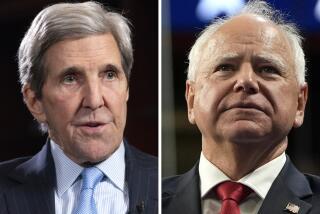Kerry’s War Tour Serves as Theme, Target
- Share via
WASHINGTON — As a young Navy lieutenant, Sen. John F. Kerry spent four months fighting in Vietnam -- a tour of duty that is the touchstone of his public career and is certain to be a central theme as he accepts the Democratic presidential nomination tonight.
His stint as a patrol boat skipper on the Mekong Delta, where he earned a Silver Star, a Bronze Star and three Purple Hearts, gave Kerry his first taste of leadership. The conflict in Vietnam inspired his early career as an antiwar activist, and its unfinished business spurred his Senate efforts to open relations with the Communist government.
The wartime experience “gives you a clarity. You know what it means to be under fire, what it means to react quickly and make tough decisions,” Kerry said in an interview earlier this year.
Kerry has used that experience effectively in his political life, surrounding himself with a cadre of former crewmates and veterans whose backing has given him a needed edge in tight elections. Several Swift boat comrades are expected to join him onstage tonight.
“What I saw back then was a guy with genuine caring and leadership ability who was aggressive when he had to be,” said former crewmate Jim Wasser. “What I see now is a guy who’s not afraid to tackle tough issues. And he knows what the consequences are of putting people’s kids in harm’s way.”
Kerry’s Vietnam service also has proved to be a target for political foes. A group of former Navy officers opposed to his presidential campaign has questioned Kerry’s abbreviated combat service and the background of one of his Purple Hearts.
Vietnam veterans long have been divided over Kerry’s peace activism after the war and his citations of alleged U.S. atrocities against Vietnamese civilians.
“He couldn’t tie the shoes of the people who were the real heroes,” said John O’Neill, a former Swift boat officer who debated Kerry 33 years ago and is now a leader of Swift Boat Veterans for Truth, a political action committee aided by Republican fundraisers.
But the broad outlines of Kerry’s military resume and his performance in battle have remained mostly unshaken. Navy records, fitness reports by Kerry’s commanders and scores of interviews with Swift boat officers and crewmen depict a model officer who fought aggressively in river ambushes and won the respect of many of his crewmates and commanders, even as his doubts about the war grew.
“I don’t like what he said after the war,” said Adrian Lonsdale, who commanded Kerry for three months in 1969. “But he was a good naval officer.”
Kerry joined the Navy midway through his junior year at Yale University, enlisting as an officer for a three-year tour after his May 1966 graduation.
After a six-month training stint on the guided missile frigate Gridley, which cruised off Vietnam’s coast, Kerry sought a command on a Swift boat -- a heavily armed patrol craft similar to the World War II-era PT boat piloted by his political role model, John F. Kennedy.
Swift boats then were being used to interdict Vietcong supply boats off the coast of South Vietnam.
But by the time Kerry reported for duty in November 1968, the boats and their five-man crews were being sent far up Vietcong-controlled rivers and canals, drawing gun and rocket fire.
Kerry was awarded his first Purple Heart after suffering a shrapnel wound as his crew exchanged fire with Vietcong fighters massed along the shore.
Several former officers opposed to Kerry’s candidacy recently have questioned his account, suggesting the wound was slight and accidentally self-inflicted.
But reviews of Navy records show that many Swift boat personnel were awarded Purple Hearts for minor wounds of uncertain origin.
Kerry led his crews on hit-and-run raids on Vietcong strongholds. In one risky gambit, he beached his boat, then chased down and killed a guerrilla who was menacing the crew with a grenade launcher. Days later, Kerry was awarded a Silver Star.
Wounded a second time in mid-February 1969 -- an incident that left a shard of shrapnel buried in his thigh -- Kerry suffered a third injury three weeks later. After a mine blast rocked his boat during a raid, the slightly injured Kerry rescued James Rassman, an Army lieutenant who had tumbled overboard. The act earned Kerry a Bronze Star.
“In the military academies, they teach you that a good leader is someone who sets aside their well-being and puts their people first while finding a way to accomplish their mission. That’s John,” said Rassman, who will help introduce Kerry tonight.
Eligible to request a transfer because of his three wounds, Kerry decided to cut short his yearlong Vietnam tour. He returned to the U.S. in March 1969, embittered by what he felt was a failed national policy that had led to the combat deaths of close friends. Kerry worked briefly as an admiral’s aide in New York, then quit to run for Congress.
Lacking a political base, Kerry’s campaign faltered and he pulled out of the race. But soon after he found national prominence as a leader of a group of antiwar Vietnam veterans. In April 1971, Kerry led a march in Washington and cited alleged U.S. atrocities during a poignant speech to a Senate committee. His antiwar prominence cast him as a hero to peace activists and a betrayer to veterans who supported the war effort.
“I think I was right, and I think history has borne that out,” Kerry said recently. “It would be good to have a president who could see those kinds of things before they happen.”
More to Read
Get the L.A. Times Politics newsletter
Deeply reported insights into legislation, politics and policy from Sacramento, Washington and beyond. In your inbox twice per week.
You may occasionally receive promotional content from the Los Angeles Times.










